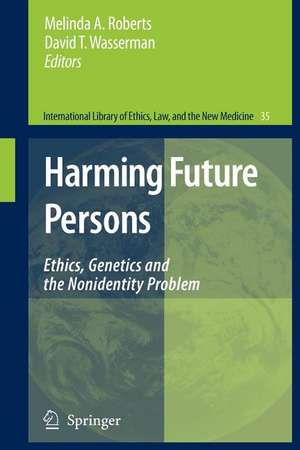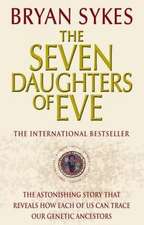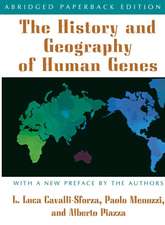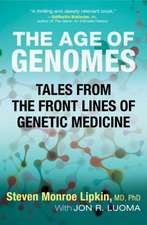Harming Future Persons: Ethics, Genetics and the Nonidentity Problem: International Library of Ethics, Law, and the New Medicine, cartea 35
Editat de Melinda A. Roberts, David T. Wassermanen Limba Engleză Paperback – 29 noi 2011
| Toate formatele și edițiile | Preț | Express |
|---|---|---|
| Paperback (1) | 948.79 lei 6-8 săpt. | |
| SPRINGER NETHERLANDS – 29 noi 2011 | 948.79 lei 6-8 săpt. | |
| Hardback (1) | 954.93 lei 6-8 săpt. | |
| SPRINGER NETHERLANDS – 31 iul 2009 | 954.93 lei 6-8 săpt. |
Din seria International Library of Ethics, Law, and the New Medicine
- 5%
 Preț: 347.30 lei
Preț: 347.30 lei -
 Preț: 397.26 lei
Preț: 397.26 lei - 15%
 Preț: 635.31 lei
Preț: 635.31 lei - 18%
 Preț: 942.76 lei
Preț: 942.76 lei - 5%
 Preț: 718.65 lei
Preț: 718.65 lei - 15%
 Preț: 634.68 lei
Preț: 634.68 lei - 15%
 Preț: 637.78 lei
Preț: 637.78 lei -
 Preț: 380.07 lei
Preț: 380.07 lei - 18%
 Preț: 959.98 lei
Preț: 959.98 lei - 15%
 Preț: 641.20 lei
Preț: 641.20 lei - 18%
 Preț: 944.19 lei
Preț: 944.19 lei - 15%
 Preț: 636.80 lei
Preț: 636.80 lei - 15%
 Preț: 643.00 lei
Preț: 643.00 lei - 18%
 Preț: 952.89 lei
Preț: 952.89 lei - 15%
 Preț: 643.48 lei
Preț: 643.48 lei - 18%
 Preț: 954.45 lei
Preț: 954.45 lei - 5%
 Preț: 1095.73 lei
Preț: 1095.73 lei - 15%
 Preț: 645.79 lei
Preț: 645.79 lei - 18%
 Preț: 1111.22 lei
Preț: 1111.22 lei - 15%
 Preț: 643.84 lei
Preț: 643.84 lei - 18%
 Preț: 1227.67 lei
Preț: 1227.67 lei - 18%
 Preț: 953.65 lei
Preț: 953.65 lei - 15%
 Preț: 638.57 lei
Preț: 638.57 lei - 5%
 Preț: 1101.21 lei
Preț: 1101.21 lei
Preț: 948.79 lei
Preț vechi: 1157.06 lei
-18% Nou
Puncte Express: 1423
Preț estimativ în valută:
181.56€ • 190.91$ • 150.01£
181.56€ • 190.91$ • 150.01£
Carte tipărită la comandă
Livrare economică 17 aprilie-01 mai
Preluare comenzi: 021 569.72.76
Specificații
ISBN-13: 9789400726048
ISBN-10: 940072604X
Pagini: 388
Ilustrații: VII, 335 p.
Dimensiuni: 155 x 235 x 25 mm
Greutate: 0.54 kg
Ediția:2009
Editura: SPRINGER NETHERLANDS
Colecția Springer
Seria International Library of Ethics, Law, and the New Medicine
Locul publicării:Dordrecht, Netherlands
ISBN-10: 940072604X
Pagini: 388
Ilustrații: VII, 335 p.
Dimensiuni: 155 x 235 x 25 mm
Greutate: 0.54 kg
Ediția:2009
Editura: SPRINGER NETHERLANDS
Colecția Springer
Seria International Library of Ethics, Law, and the New Medicine
Locul publicării:Dordrecht, Netherlands
Public țintă
ResearchCuprins
Can Bringing a Person into Existence Harm That Person? Can an Act That Harms No One Be Wrong?.- The Intractability of the Nonidentity Problem.- If Bringing a Badly Off Person into Existence is Wrong, is Not Bringing aWell Off Person into Existence Also Wrong?.- Rights and the Asymmetry Between Creating Good and Bad Lives.- Asymmetries in the Morality of Causing People to Exist.- Must an Act Worse for People be Worse for a Particular Person?.- Who Cares About Identity?.- Do Future Persons Presently Have Alternate Possible Identities?.- Rule Consequentialism and Non-identity.- Is the Argument to “No Harm Done” Correct? Must an Act that Harms a Person Make that Person Worse Off?.- Harming as Causing Harm.- Wrongful Life and Procreative Decisions.- Harming and Procreating.- The Nonidentity Problem and the Two Envelope Problem: When is One Act Better for a Person than Another?.- Is the Morality of Parental Reproductive Choice Special? Can Intentions and Attitudes Make an Act that Harms No One Wrong?.- Reproduction, Partiality, and the Non-identity Problem.- Two Varieties of “Better-For” Judgements.- Harms to Future People and Procreative Intentions.- Is the Person Affecting Approach Objectionable Independent of the Nonidentity Problem?.- Can the Person Affecting Restriction Solve the Problems in Population Ethics?.- What are the Implications of the Nonidentity Problem for Law and Public Policy?.- Implications of the Nonidentity Problem for State Regulation of Reproductive Liberty.- Reparations for U.S. Slavery and Justice Over Time.
Recenzii
From the reviews:
“This volume is intentionally and wholeheartedly a philosophical book dealing with conceptual analysis (a lot of papers address aspects of ‘harm’), the analysis of ethical judgments, meta-ethical questions (the tension between deontology and consequentialism) and the ontology (or semantics) of future and non-existing persons. … this book is highly recommended for everyone interested in the impact of our actions on future people–not for philosophers only.” (Michael Quante, Medicine Health Care & Philosophy, Issue 4, 2010)
“This volume is intentionally and wholeheartedly a philosophical book dealing with conceptual analysis (a lot of papers address aspects of ‘harm’), the analysis of ethical judgments, meta-ethical questions (the tension between deontology and consequentialism) and the ontology (or semantics) of future and non-existing persons. … this book is highly recommended for everyone interested in the impact of our actions on future people–not for philosophers only.” (Michael Quante, Medicine Health Care & Philosophy, Issue 4, 2010)
Textul de pe ultima copertă
This collection of essays investigates the obligations we have in respect of future persons, from our own future offspring to distant future generations. Can we harm them? Can we wrong them? Can the fact that our choice brings a worse off person into existence in place of a better off but "nonidentical" person make that choice wrong?
We intuitively think we are obligated to treat future persons in accordance with certain stringent standards—roughly those we think apply to our treatment of existing persons. We think we ought to create better lives for at least some future persons when we can do so without making things worse for too many existing or other future persons. We think it would be wrong to engage in risky behaviors today that will have clearly adverse effects for the children we intend one day to conceive. And we think it would be wrong to act today in a way that would turn the Earth of the future into a miserable place.
Each of these intuitive points is, however, challenged by the nonidentity problem. That problem arises from the observation that future persons often owe their very existence to choices that appear to make things worse for those same persons. New reproductive technologies, for example, can be both risky and essential to one person’s coming into existence in place of a "nonidentical" other or no one at all. But so can a myriad of other choices, whether made just prior to conception or centuries before—choices that seem to have nothing to do with procreation but in fact help to determine the timing and manner of conception of any particular future person and thus the identity of that person. Where the person’s life is worth living, it is difficult to see how he or she has been harmed, or made worse off, or wronged, by such an identity-determining choice. We then face the full power of the nonidentity problem: if the choice is not bad for the future person it seems most adversely to affect, then onwhat basis do we say that choice is wrong?
The nonidentity problem has implications for moral theory, population policy, procreative choice, children’s rights, bioethics, environmental ethics, the law and reparations for historical injustices. The contributors to this collection offer new understandings of the nonidentity problem and evaluate an array of proposed solutions to it. Aimed at philosophers, legal scholars, bioethicists and students in all these disciplines, this collection is a thorough exploration of one of the most fascinating and important moral issues of our time.
We intuitively think we are obligated to treat future persons in accordance with certain stringent standards—roughly those we think apply to our treatment of existing persons. We think we ought to create better lives for at least some future persons when we can do so without making things worse for too many existing or other future persons. We think it would be wrong to engage in risky behaviors today that will have clearly adverse effects for the children we intend one day to conceive. And we think it would be wrong to act today in a way that would turn the Earth of the future into a miserable place.
Each of these intuitive points is, however, challenged by the nonidentity problem. That problem arises from the observation that future persons often owe their very existence to choices that appear to make things worse for those same persons. New reproductive technologies, for example, can be both risky and essential to one person’s coming into existence in place of a "nonidentical" other or no one at all. But so can a myriad of other choices, whether made just prior to conception or centuries before—choices that seem to have nothing to do with procreation but in fact help to determine the timing and manner of conception of any particular future person and thus the identity of that person. Where the person’s life is worth living, it is difficult to see how he or she has been harmed, or made worse off, or wronged, by such an identity-determining choice. We then face the full power of the nonidentity problem: if the choice is not bad for the future person it seems most adversely to affect, then onwhat basis do we say that choice is wrong?
The nonidentity problem has implications for moral theory, population policy, procreative choice, children’s rights, bioethics, environmental ethics, the law and reparations for historical injustices. The contributors to this collection offer new understandings of the nonidentity problem and evaluate an array of proposed solutions to it. Aimed at philosophers, legal scholars, bioethicists and students in all these disciplines, this collection is a thorough exploration of one of the most fascinating and important moral issues of our time.
Caracteristici
Examines what we owe future persons from both moral and legal perspectives Deeply probes particular concerns in areas ranging from the new reproductive technologies to the structure of morality Ranges from the practical (is it wrong to bring an impaired child into existence?) to the theoretical (can “bad” acts be “bad for” no one?) Is written by the most noted scholars and theorists amongst those working today on matters relating to future persons Extends and applies the powerful work Derek Parfit commenced in his brilliant and influential book Reasons and Persons














